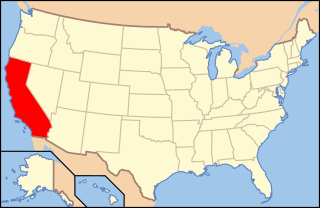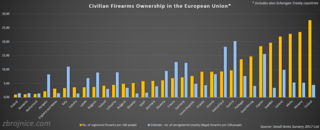Related Research Articles
Gun laws and policies regulate the manufacture, sale, transfer, possession, modification and use of small arms by civilians.
In the United Kingdom, access by the general public to firearms is subject to some of the strictest control measures in the world. Laws differ and are generally less restrictive in Northern Ireland. Concerns have been raised over the availability of illegal firearms.
Gun laws in Finland incorporates the political and regulatory aspects of firearms usage in the country. Both hunting and shooting sports are common hobbies among Finns. There are approximately 300,000 people with hunting permits and 34,000 people belong to sport shooting clubs. Over 1500 people are licensed weapons collectors. Additionally, many reservists practice their skills using their own semi-automatic rifles and pistols after the military service.

Firearms regulation in Switzerland allows the free acquisition of semi-automatic, and—with a permit—fully automatic firearms, by Swiss citizens and some foreigners with permanent residence. The laws pertaining to the acquisition of firearms in Switzerland are in many respects more liberal than most nations. A reason is not required to own a gun unless the reason is other than sport-shooting, hunting, or collecting. Permits for concealed carrying in public are issued sparingly. The acquisition of fully automatic weapons, suppressors and target lasers requires special permits issued by the cantonal firearms office. Use of hollow-point and soft-point ammunition is limited to hunting.
In South Africa, the Firearms Control Act 60 of 2000 regulates the ownership of firearms by civilians. Ownership of a firearm is conditional on a competency test and several other factors, including background checking of the applicant, inspection of an owner's premises, and licensing of the weapon by the police introduced in July 2004. The process is currently undergoing review, as the police are at present, not able to adequately or within reasonable time, process either competency certification, new licences or renewal of existing licences. Minimum waiting period used to exceed 2 years from date of application. The Central Firearms Registry implemented a turnaround strategy that has significantly improved the processing period of new licences. The maximum time allowed to process a licence application is now 90 days.

Concealed carry refers to the practice of carrying a handgun or other weapon in public in a concealed or hidden manner, either on one's person or in close proximity. While most law enforcement officers carry their handguns in a visible holster, some officers, such as plainclothes detectives or undercover agents, carry weapons in concealed holsters. In some countries and jurisdictions, civilians are legally required to obtain a concealed carry permit in order to possess a firearm. In others, a permit is only required if the firearm is not visible to the eye, such as carrying said weapon in one's purse, bag, trunk, etc. The opposite of concealed carry is called open carry.

The European driving licence is a driving licence which replaced the various driving licence styles formerly in use in the member states of the European Economic Area (EEA). The licence is currently issued by all of the EEA member states; all 27 EU member states and 3 EFTA member states; Iceland, Liechtenstein and Norway, as well as the United Kingdom during the transition period after the UK withdrew from the EU. It is credit card-style with a photograph and even a microchip. They were introduced to replace the 110 different plastic and paper driving licences of the 300 million drivers in the EEA. The main objective of the licence is to reduce the risk of fraud.
The gun laws of New Zealand are contained in the Arms Act 1983 statute, which includes multiple amendments including those that were passed subsequent to the 1990 Aramoana massacre and 2019 Christchurch mosque shootings.
Gun laws in Norway incorporates the political and regulatory aspects of firearms usage in the country. Citizens are allowed to keep firearms. The acquisition and storage of guns is regulated by the state.
In Germany, access to guns is controlled by the German Weapons Act which adheres to the European Firearms Directive, first enacted in 1972, and superseded by the law of 2003, in force as of 2016. This federal statute regulates the handling of firearms and ammunition as well as acquisition, storage, commerce and maintenance of firearms.

Gun laws in California regulate the sale, possession, and use of firearms and ammunition in the state of California in the United States.

Gun laws in the Czech Republic in many respects differ from those in other Member states of the European Union (see Gun laws in the European Union). A gun in the Czech Republic is available to anybody subject to acquiring a shall issue firearms license. Gun licenses may be obtained in a way similar to a driving license – by passing a gun proficiency exam, medical examination and having a clean criminal record. Unlike in most other European countries, the Czech gun legislation also permits a citizen to carry a concealed weapon for self-defense – 248,278 out of 305,452 legal gun owners have a concealed carry permit. The vast majority of Czech gun owners possess their firearms for protection, with hunting and sport shooting being less common.
This is a list of laws concerning air guns by country.

Gun laws in New York regulate the sale, possession, and use of firearms and ammunition in the U.S. state of New York, outside of New York City which has separate licensing regulations.

Gun laws in Oklahoma regulate the sale, possession, and use of firearms and ammunition in the state of Oklahoma in the United States.
Gun laws in Idaho regulate the sale, possession, and use of firearms and ammunition in the state of Idaho in the United States.

Directive on intra-EU-transfers of defence-related products is a European Union Directive with relevance for the European Economic Area. It is also known as the "ICT-Directive".
The National Arms Association of Spain is a Spanish non-profit organisation which defends the ownership and recreational use of firearms by law-abiding citizens under national legislation. As current legislation is restrictive by nature, most effort is placed on the adaptation of national laws to EU directive, and defending the rights of gun owners by legal means. Since self-defense is not considered as sufficient motive for acquiring a firearm licence, the principal collectives represented by the association consist of precision and practical shooters, hunters and arms collectors.

The European Firearms Directive is a law of the European Union which sets minimum standards regarding civilian firearms acquisition and possession that EU Member States must implement into their national legal systems.
Polish law allows firearm ownership on shall-issue basis for hunting, sport shooting and collection purposes and may-issue basis for self-defense purposes. With approximately 2.5 civilian firearms per 100 people, Poland is the 166th most armed country in the world. Only 0.6% of citizens have valid firearm permits.
References
- ↑ "Current Irish legal requirements mentioning the EFP, as of January 2011". Archived from the original on 2012-04-13. Retrieved 2011-01-02.
- ↑ "Thames Valley Police notes, January 2011". Archived from the original on 2012-03-15. Retrieved 2011-01-02.
- ↑ Directive 91/477/EEC
- ↑ Text of 2008/51/EC